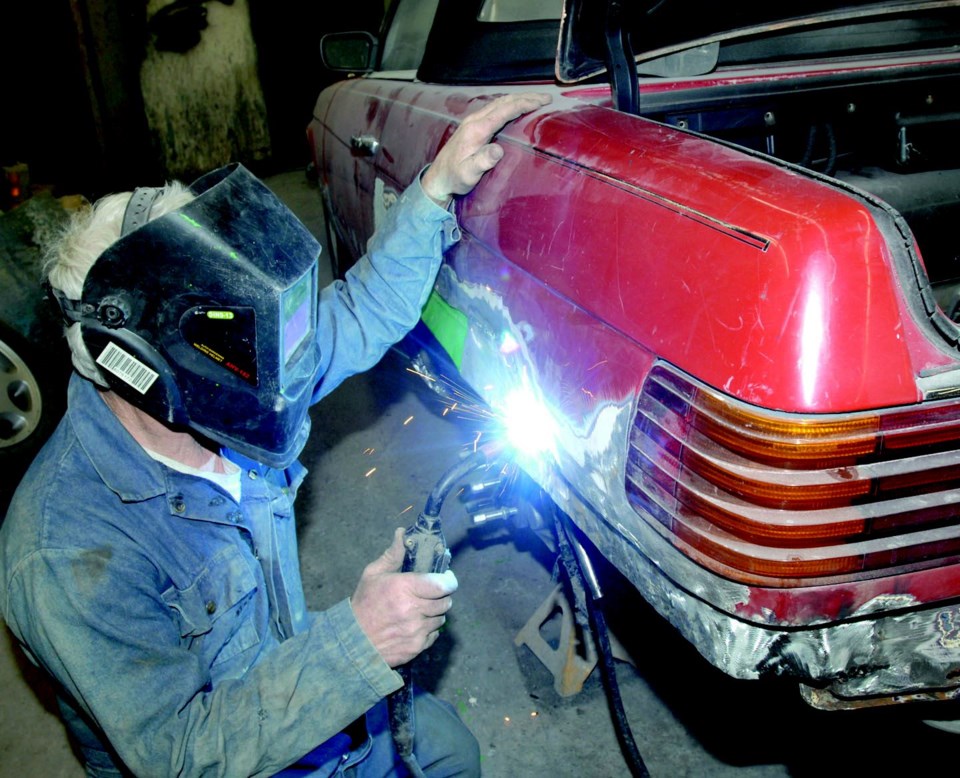Wayne Sponagle can't do anything about ICBC's plan to raise vehicle insurance premiums in 2012, but he's offering some advice to vehicle owners with damage claims who want to keep the cost of auto body repairs down.
Don't forget the little guys.
Sponagle, the owner of Kapital Collision in Prince George, says ICBC is penalizing body shops that are not ICBC-accredited by not recommending their services and that practice is driving away new customers and hurting his business.
"They're discriminating against me and they're taking away my livelihood because Express Repair is their baby and they don't want anybody going anywhere else," Sponagle said. "They are telling people they don't want them to go to my shop because they can't make me guarantee my work, which is a lie. They've totally taken away the free-enterprise system and it's their policies that have caused the cost of repairs to escalate."
ICBC introduced the Express Repair Program in 2002. Accredited shops are paid rates based on their ICBC ratings, which designate five levels of service which range from the basic c.a.r. (collision approved repair) shop to the top-ranked (earned authority) c.a.r. shop VALET. Base supplier shops like Sponagle's, outside of ICBC's realm, are paid the lowest rates.
Sponagle recently had a customer who received an estimate from an Express Repair shop for $2,500. His shop did the repair, but he received only $1,800 in payment from ICBC. While a fully-accredited ICBC shop with earned authority gets $70 per hour for body work labour and $70 per hour for paint work labour, a base supplier receives $50.55 per hour for its body labour and $34.68 per hour for paint labour.
"I get paid $1,800 for doing the exact same job as a $2,500 repair at an Express Repair shop," Sponagle said. "Multiply that a thousand times all over B.C. and you tell me how much the cost of repairs has increased. It's not the only reason insurance premiums are going up, but it's part of it."
Rick Setter, ICBC's manager of accreditation programs, said ICBC customers are free to choose where they take their vehicles for body repairs and ICBC policy forbids ICBC staff from influencing or directing customers to specific facilities. But on the ICBC website under the heading "Making a claim," only ICBC-accredited body shops appear on the list.
"We do not direct work," Setter said. "If a customer chooses a base supplier then we will make some changes [to the rates] on the estimate, but we will never be directing customers to, or away from, those shops."
Non-accredited shops must have all repairs inspected in person by an ICBC inspector, a rule that doesn't apply to Express Repair shops. ICBC-accredited repair shops use specialized computer technology to create estimates and send photographs electronically to claims estimators for final approval. In most cases, that eliminates the need for a claims estimator to visit the shop, which Setter said reduces the time it takes for the repair.
He said the faster turnaround time and the cost of the equipment in those approved shops partially justifies the higher rates paid. He said there's no requirement for base suppliers to guarantee repairs, but all ICBC shops do that and there's also a clause that will guarantee the work if the ICBC shop that did the repair goes out of business. ICBC shop mechanics have to meet specific qualifications and there are mandatory training requirements every year to keep pace with advancing technology. Other shops face same predicament
Sponagle is not alone in his concern, at least two other base supplier body shop owners in the city are feeling the pinch.
"If a customer wants us to work on their car, ICBC just makes it really inconvenient by saying, 'You're going to have to pay for it, they're not going to look after anything extra,' so they do steer work away from us just because we're not a preferred shop," said Pat Franklin, who owns Gateway Autobody.
"What they are doing is not fair because we're actually saving ICBC money because we work for less. We have all the equipment they ask for and just the same kind of guys. But with all the hoops you have to jump through to be an accredited shop we just chose not to be. They say you have to have two bathrooms and a certain amount of parking stalls. It's just silly."
To try to increase the flow of new customers to his eight-year-old business, Steve Markovics of Riley's Autobody is in the process of getting his ICBC accreditation, a process that takes about two years.
"I get really frustrated when I hear from my customers, 'I was going to bring it to your shop but ICBC told me I had to pick one of the shops are their list,'" said Markovics.
"The hourly rate is ridiculously different. On the paint side, I get $34.68 an hour, half of what an ICBC shop gets, and I'm using the exact same paint from the same store. It tough to compete. The gap is getting so large, I don't have much of a choice, and I'm trying to become an Express shop.
"Right now is collision season and our business keeps dropping off every year. I notice more and more that we don't get to meet new ICBC customers, we only get to meet our existing ones because if people are in an accident they don't know about us."



